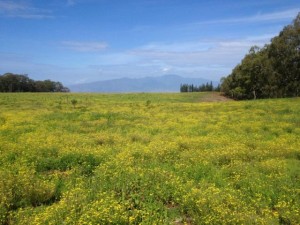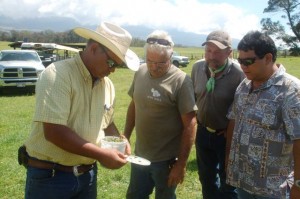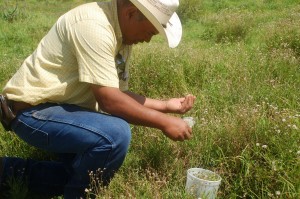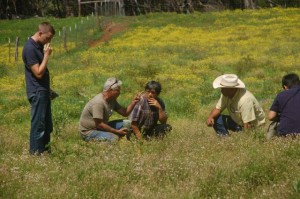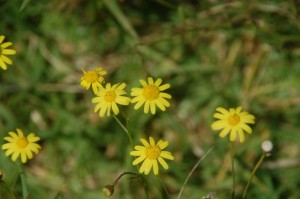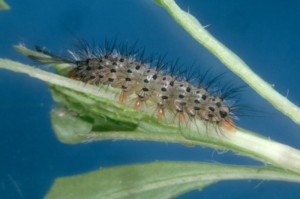Biocontrol Moths Released on Maui to Fight Invasive Fireweed
Posted on Mar 21, 2013 in 2013 News Releases, News-ReleasesMarch 21, 2013
NR13-05
HONOLULU – Maui ranchers joined entomologists from the Hawaii Department of Agriculture (HDOA) at Haleakala Ranch this afternoon to release a biological control insect that will help to control the invasive fireweed which is highly toxic to cattle and horses. More than 13 years of research preceded today’s release of the Madagascan fireweed moth, Secusio extensa (Arctiidae). It is the state’s best hope of controlling the Madagascar fireweed that has taken over massive areas of Hawaii pasturelands.
Today, HDOA released about 50 moths and 500 larvae (caterpillar stage) in a field of fireweed on Haleakala Ranch. In addition, a total of 2,000 more larvae and moths were given to ranchers from 10 Maui ranches to release on their fireweed. In February, the first release of the fireweed moth was made on Kahua Ranch on Hawaii Island. More releases will continue on both islands.
The Madagascan fireweed moth larvae voraciously consume the leaves specifically of fireweed plants, which is estimated to have taken over more than 850,000 acres of pastureland, mainly on Maui and Hawaii Island. It is believed that fireweed came to the islands in hydromulch material imported from Australia. The state approved the release of the moth in 2010, but also required approval of a federal permit, which was finalized by the U.S. Department of Agriculture on Dec. 6, 2012.
“The benefits of finding a suitable biological control for an invasive species is that it works continuously and it works for free,” said Russell S. Kokubun, chairperson of the Hawaii Board of Agriculture. “So, our entomologists have carefully researched the fireweed moth to make sure that it would only feed on the invasive fireweed.”
A rearing and release program has been developed in collaboration between ranchers, HDOA, and the University of Hawaii College of Tropical Agriculture and Human Resources. The program’s goal is to release large quantities of caterpillars and moths to help control fireweed.
“We made the first release on the Big Island about a month ago and, so far, the fireweed moths appear to be surviving in the wild despite the cold, rainy and windy conditions,” said Darcy Oishi, HDOA’s Biocontrol Section Chief. “As far as impact on the fireweed, it’s going to take a while before we can gauge that. There’s so much fireweed out there, it’s like a massive buffet for the larvae.”
In 1999, HDOA began looking for a biological control for the deadly Madagascar fireweed, also known as Madagascar Ragwort, which has yellow daisy-like flowers. Although there are effective pesticides, they are cost-prohibitive and impractical to use across hundreds and thousands of acres. Besides Hawaii, fireweed has spread through many parts of the world killing animals in Australia, Brazil, Argentina, Colombia, Venezuela, Uruguay, and Japan. The moths released today are the first biocontrol agent to be released against Madagascar fireweed in the world.
Early on, the Hawaii Cattlemen’s Council agreed that biocontrol was the only feasible long-term option for control of fireweed. The Council funded the first exploratory trips by HDOA entomologists to southern Africa and Madagascar to search for an insect or disease that could safely control fireweed.
HDOA’s exploratory entomologist, Dr. Mohsen Ramadan, traveled to Australia, South Africa and Madagascar in 1999 and returned with 14 insects and one fungus, which were researched and tested under quarantine conditions. Some were found to be ineffective, while others were found to harm other native or beneficial plants. Dr. Ramadan traveled to the region again in 2005, 2007, 2011 and 2012 to look for more potential biocontrols for fireweed and other pests, such as coffee berry borer, small hive beetle and the protea mealybug. HDOA is also testing four other potential natural enemies of fireweed, each which appear to attack different parts of the plant.
Present at today’s release were Maui ranchers Greg Friel (Haleakala Ranch), Annette Niles (Niles-Perreira Ranch), Gerard Thompson (Thompson Ranch), Joe Santos (Kaupo Ranch), Sydney Smith (Maliko Ranch), Jarett Sakamoto (Santos Ranch), William Jacintho (Naalae Beef), Mark Paris (ZD Ranch), and Jeff Alexander (Anuhea Ranch).
###

